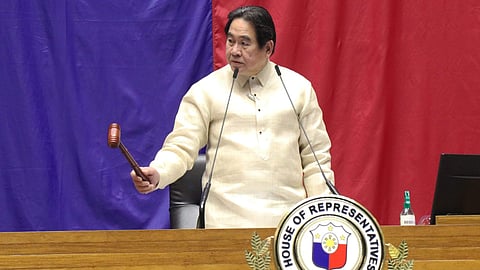
- NEWS
- the EDIT
- COMMENTARY
- BUSINESS
- LIFE
- SHOW
- ACTION
- GLOBAL GOALS
- SNAPS
- DYARYO TIRADA
- MORE

A House of Representatives panel chairperson on Friday urged the Senate leadership to reconsider its resistance to amending the Constitution’s economic provisions, citing strong public support for the changes.
Cagayan de Oro Rep. Rufus Rodriguez, who heads the House committee on constitutional amendments, called on Senate President Francis “Chiz” Escudero to begin deliberations on Resolution of Both Houses (RBH) 6.
The resolution is the Senate’s counterpart to the House’s RBH 7, which it approved in March.
“I urge Senate President Chiz Escudero and our senators to address both our and their economic constitutional amendment proposals, especially in light of recent surveys showing strong public backing for an economic cha-cha,” Rodriguez said.
Rodriguez was referring to the latest survey by big data research firm Tangere, which showed that 60.6 percent of Filipinos support economic Charter change (cha-cha). Of these, 25.2 percent “strongly agree” and 35.4 percent “somewhat agree” to the amendments.
At the opening of the Senate session on Monday, Escudero announced that legislation that “divide the public,” including RBH 6, will not be given priority.
“Pending bills on Charter change will be placed on the back-burner and will follow the ordinary and regular process of legislation, if at all. In its stead, bills which can affect the same result, but without the needless political noise and bickering, will be prioritized,” Escudero told his colleagues.
Rodriguez countered, however, that the Senate could start the committee hearings on the amendment measure while the House tackles the P6.352-trillion national budget for fiscal year 2025.
The national expenditure, expected to be submitted on Monday, will go through the House before it is forwarded the Senate for its scrutiny.
RBH 7 mimics RBH 6, with the only distinction being the manner of voting. Both resolutions aim to remove foreign ownership restrictions in public utilities, higher education, and advertising by amending Articles 12, 14, and 16 of the Constitution, which are perceived to be limiting the Philippines’ economic potential.
To recall, the House and the Senate had traded barbs over the latter’s reluctance to amend the 37-year-old Charter, where both chambers would vote as one body, for fear this would eliminate the upper chamber from the legislative branch.
Attempts to revamp the Charter had failed in past Congresses due to suspicions that the move was a veiled bid by politicians to perpetuate themselves in power.
Several experts also believe that economic growth could be attained without tinkering with the Constitution, if the government concentrates on enforcing current laws and combating corruption.
